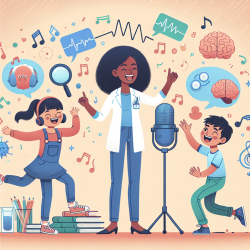Recent research published in Frontiers in Psychology highlights an intriguing link between singing abilities and Specific Language Impairment (SLI) in children. This study, titled "Singing abilities in children with Specific Language Impairment (SLI)," provides valuable insights for practitioners aiming to improve outcomes for children with SLI.
SLI is a neurodevelopmental disorder affecting 2-7% of children, characterized by difficulties in learning to produce and understand speech despite normal intelligence and hearing. The study investigated whether these language impairments extend to the musical domain, particularly singing.
The researchers assessed the singing abilities of eight children with SLI and 15 children with typical language development (TLD). They designed two tasks: a pitch-matching task where children sang single notes and a melodic reproduction task where children sang short melodies. The results showed that children with SLI had significant difficulties in both tasks compared to their TLD peers.
Key Findings
- Children with SLI had a mean pitch error of 250 cents in the pitch-matching task, compared to 154 cents for children with TLD.
- In the melodic reproduction task, children with SLI received lower quality ratings from adult judges.
- There was a strong correlation between musical perception and production abilities, suggesting a general auditory-motor dysfunction in children with SLI.
Implications for Practitioners
These findings suggest that incorporating musical activities, such as singing, into therapy sessions could be beneficial for children with SLI. Here are some practical steps for practitioners:
- Integrate Singing into Therapy: Use simple pitch-matching and melodic reproduction exercises to help children improve their auditory-motor coordination.
- Monitor Progress: Regularly assess both language and musical abilities to tailor interventions effectively.
- Collaborate with Music Therapists: Partner with music therapists to create comprehensive, multidisciplinary treatment plans.
Encouraging further research in this area can help refine these strategies and uncover additional benefits of musical interventions for children with SLI. The study's findings underscore the potential of singing as a therapeutic tool to enhance both language and musical skills.
To read the original research paper, please follow this link: Singing abilities in children with Specific Language Impairment (SLI).










